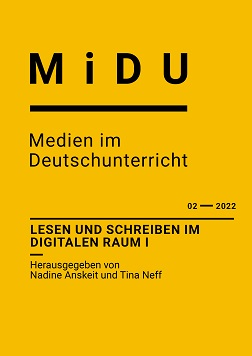Digitale Lesepraxis in die Schulen! Zur Konzeption eines digitalen handlungs- und produktionsorientierten Literaturunterrichts
DOI:
https://doi.org/10.18716/ojs/midu/2022.2.3Schlagwörter:
Handlungs- und produktionsorientierter Literaturunterricht, Digitalität, Netzkultur, Social Media, Social ReadingAbstract
Im toten Winkel der Kulturkritiker*innen findet die Anschlusskommunikation Jugendlicher heute zum großen Teil im Internet statt und zeichnet sich u.a. dadurch aus, dass verschiedenste Medienprodukte gestaltet werden. Soziale Netzwerke, Video- und Literaturportale, in denen diese Produkte geteilt, kommentiert, diskutiert und überarbeitet werden, prägen mittlerweile die literarische Sozialisation. Der folgende Beitrag setzt sich mit der Frage auseinander, inwiefern ein digitaler handlungs- und produktionsorientierter Literaturunterricht die häufig festgestellte unproduktive Aufspaltung zwischen Schul- und Privatlektüre vermindert und dabei Interpretationskompetenz fördern kann. Hierfür werden nach einer kurzen Einführung (1) zunächst die digitalen Lesepraktiken Jugendlicher charakterisiert (2), um aus diesen Problemstellungen für den schulischen Literaturunterricht abzuleiten (3) und diese für einen digitalen handlungs- und produktionsorientierten Literaturunterrichts zu adaptieren. Unter Rückgriff auf Spinners und Köpperts Konzeption handlungs- und produktionsorientierten Literaturunterrichts wird ein Phasenmodell entworfen (4) und an einem Unterrichtsbeispiel veranschaulicht (5).
Abstract (english): Digital reading culture goes school! On the conception of digital action- and production-oriented literature lessons
In the blind spot of cultural critics, young people‘s follow-up communication today largely takes place on the Internet and is characterized, among other things, by the fact that a wide variety of media products are created. Social networks, video and literature portals, in which these products are shared, commented on, discussed and revised, now shape literary socialization. The following article addresses the quest-ion of the extent to which digital action- and production-oriented literature instruction is able to reduce the unproductive split between school and private reading and can promote interpretive competence in the process. For this purpose, after a short introduction (1), the digital reading practices of young people are first characterized (2) in order to derive problems for school literature lessons from these (3) and to adapt them for digital action- and production-oriented literature lessons. Using Spinner‘s and Köppert‘s concept of action- and production-oriented literature lessons, a phase model is designed (4) and illustrated with a lesson example (5).
Downloads
Veröffentlicht
Ausgabe
Rubrik
Lizenz
Copyright (c) 2022 MiDU - Medien im Deutschunterricht

Dieses Werk steht unter der Lizenz Creative Commons Namensnennung - Keine Bearbeitungen 4.0 International.







